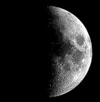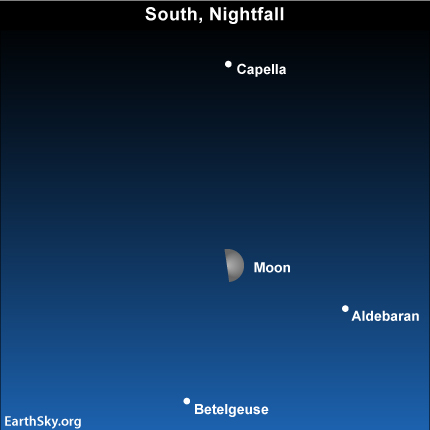Courtesy of EarthSky
A Clear Voice for Science
Visit EarthSky at
www.EarthSky.org

 The first quarter moon will be shining between two brilliant stars tonight. Capella, the brightest star in the constellation Auriga, will be beaming north of the moon, while Betelgeuse, the star marking the right shoulder in the constellation Orion, will be shining south of the moon. From mid-northern latitudes in Europe and Asia, you will see the moon farther west (right), and closer to the star Aldebaran, than we do in North America. Nonetheless, everyone around the world will see the moon near these three stars.
The first quarter moon will be shining between two brilliant stars tonight. Capella, the brightest star in the constellation Auriga, will be beaming north of the moon, while Betelgeuse, the star marking the right shoulder in the constellation Orion, will be shining south of the moon. From mid-northern latitudes in Europe and Asia, you will see the moon farther west (right), and closer to the star Aldebaran, than we do in North America. Nonetheless, everyone around the world will see the moon near these three stars.
The moon swings full circle in front of the starry heavens in a little over 27 days. Twenty-seven days from now – on the night of April 8 – look for a waxing crescent moon to return to nearly the same spot in front of the background stars. Once again, you will see the moon between Capella and Betelgeuse.
The moon revolves around the Earth on roughly the same plane that the Earth and other solar system planets revolve around the sun. Therefore, we can use the moon to find the planets, because the moon journeys close to every planet each month. About a week from now – on March 19 and 20 – the full moon and nearly full moon will soar fairly close to the planet Saturn. By the month’s end – on March 30 and 31 – the waning crescent moon will couple up with the planet Venus in the eastern dawn and predawn sky.
Meanwhile, see if you can identify the brilliant stars Capella and Betelgeuse near the moon this Saturday night.
Capella, the Winter Circle’s northernmost star
Betelgeuse will explode someday
Astronomy Picture of the Day from NASA/JPL
U.S. Naval Observator Astronomical Information center
The York County Astronomical Society
 Print This Post
Print This Post








